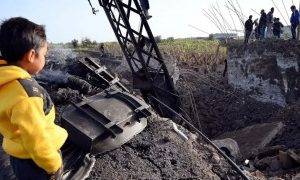
The Israeli military has carried out air strikes on targets belonging to the Palestinian militant group Hamas in southern Lebanon and the Gaza Strip.
The military said the attacks were a response to a barrage of 34 rockets fired from Lebanon into northern Israel on Thursday, which it blamed on Hamas.
Militants in Gaza fired dozens more rockets after the strikes began.
Tensions are high following two nights of Israeli police raids at the al-Aqsa mosque in Jerusalem earlier this week.
The raids triggered violent confrontations with Palestinians inside the mosque, which is Islam’s third holiest site, and caused anger across the region.
Hamas did not say that it fired the rockets from Lebanon, which was the biggest such barrage in 17 years.
But its leader Ismail Haniyeh, who was visiting Beirut at the time, said Palestinians would not “sit with their arms crossed” in the face of Israeli aggression.
Late on Friday, two British-Israeli sisters were killed in a shooting attack in the occupied West Bank, while an Italian tourist was also killed when a car drove down a beachside promenade in Tel Aviv.
In response, Prime Minister Benjamin Netanyahu ordered the police and army to mobilise their reserves to bolster counter-terrorism efforts.
The strikes in Lebanon took place in the area south of the coastal city of Tyre.
Early on Friday, there were two or three explosions around the Rashidieh Palestinian refugee camp, 5km (3 miles) from the city.
Lebanese media also reported strikes on the outskirts of the village of al-Qulaila, another 4km further south. Photographs appeared to show that a small bridge was destroyed.
The Israel Defense Forces (IDF) tweeted that its warplanes struck “terrorist infrastructures belonging to Hamas” in Lebanon.
“The IDF will not allow the Hamas terrorist organization to operate from within Lebanon and hold the state of Lebanon responsible for every directed fire emanating from its territory,” it warned.
Hamas said it strongly condemned “the blatant Zionist aggression against Lebanon in the vicinity of Tyre at dawn today [Friday]”.
In Gaza, more than 10 Hamas targets were hit, including a shaft for an underground site to construct weapons, three other weapons workshops and an underground “terrorist tunnel”, the IDF said.
During the strikes, at least 44 rockets were fired from Gaza towards southern Israel, Israeli media reported.
Most were intercepted by Israel’s Iron Dome defence system or fell in open areas, but at least one house in the city of Sderot was hit.
There were no immediate reports of any casualties from either the strikes or the overnight rocket fire.
A man was injured by shrapnel in northern Israel on Thursday afternoon as a result of the rocket fire from Lebanon, which the Lebanese army said originated from the outskirts of al-Qulaila and two other border villages near Tyre – Maaliya and Zibqine.
The Israeli military said 25 of the 34 rockets were intercepted, but that five hit Israeli territory.
In the north-western border town of Shlomi, the rockets left craters in the road, and damaged vehicles and a bank. A car was also damaged in the village of Fassuta.
The attack came hours after the Lebanese militant group Hezbollah, which controls much of southern Lebanon, said it would support “all measures” taken by Palestinian groups against Israel.
Mr Netanyahu promised on Thursday night that Israel’s response would “exact a significant price from our enemies”.
An Israeli military spokesman told reporters following the overnight strikes in Lebanon and Gaza that the operation was over for the moment.
“Nobody wants an escalation right now,” Lt Col Richard Hecht said. “Quiet will be answered with quiet, at this stage I think, at least in the coming hours.”
The memory of Israel’s 2006 war with Hezbollah is fresh in minds on both sides of the border.
Back then, a cross-border operation by Hezbollah infiltrators to capture Israeli soldiers spiralled into a month-long ground war inside Lebanon between the militant group and Israeli forces.
Analysts say both sides were left bruised by that conflict, and neither is seen as wanting another war now.
For Israel, there is the added risk of pulling in Hezbollah’s Iranian backers.
Israel’s response this time is seen as wanting to avoid re-igniting that conflict – targeting sites linked to Hamas, rather than punishing Hezbollah for hosting them in southern Lebanon.
But the path to conflict is often paved with mistake and miscalculation; if rocket fire killed civilians inside Israel, the response would almost certainly be different.
Meanwhile, the tit-for-tat exchanges with Palestinian militants in Gaza continue.
The next couple of weeks are especially risky, as the Jewish Passover holiday and the Muslim holy month of Ramadan overlap, adding sensitivity to any incidents around the holy sites in Jerusalem.
Source – BBC News


Share your thoughts